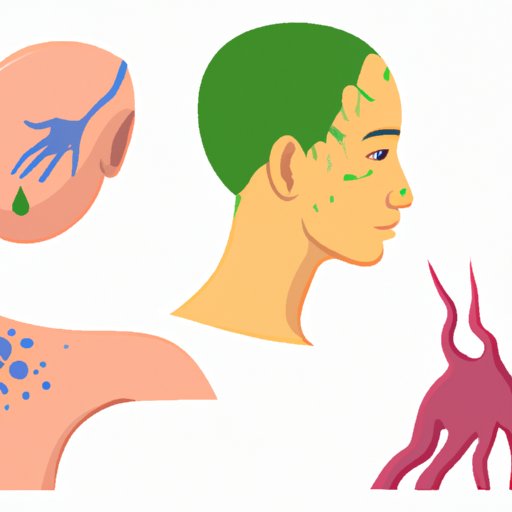
I. Introduction
Parasites are organisms that live on or inside another organism (host) and rely on the host for survival. While some parasites are harmless, others can cause serious health problems.
In this article, we will explore how to identify if you have parasites and discuss common symptoms, causes, and treatments.
II. Symptoms of Parasite Infections
The symptoms of a parasitic infection can vary depending on the type of parasite. Here are some common symptoms that may indicate a possible infection:
- Abdominal pain and bloating
- Diarrhea
- Fatigue
- Unexplained weight loss
- Anemia
- Nausea or vomiting
- Itching around the anus, especially at night
- Allergies or hives
- Coughing or wheezing
If you experience any of these symptoms, it’s important to seek medical attention. Early detection and treatment can help prevent serious health problems.
III. Causes of Parasite Infections
Several factors can lead to parasitic infections in humans:
- Poor sanitation and hygiene practices
- Consuming contaminated food or water
- Traveling to areas with poor sanitation and hygiene practices
- Exposure to infected individuals or animals
- Having a weakened immune system
It’s important to note that the factors leading to parasitic infections can vary based on location and lifestyle. For example, individuals who live in developing countries with poor sanitation and hygiene practices may be at a higher risk of parasitic infections than those living in developed countries.
IV. The Most Common Parasites and How to Identify Them
There are several parasites that commonly infect humans, including:
- Giardia
- Cryptosporidium
- Tapeworms
- Roundworms
- Hookworms
- Pinworms
Each of these parasites has a unique life cycle and transmission method. Some parasites are spread through contaminated food or water, while others can be contracted through direct contact with infected individuals or animals.
Common signs and symptoms of each of these parasites include:
- Giardia: Diarrhea, gas, stomach or abdominal cramps, upset stomach, nausea, vomiting, and dehydration.
- Cryptosporidium: Diarrhea, dehydration, stomach cramps or pain, fever, nausea, and vomiting.
- Tapeworms: Abdominal pain, diarrhea, weight loss, loss of appetite, and fatigue.
- Roundworms: Abdominal pain, diarrhea, nausea, vomiting, visible worms in stool, and weight loss.
- Hookworms: Abdominal pain, diarrhea, anemia, and weakness.
- Pinworms: Itching around the anus, especially at night, irritability and sleeplessness.
If you suspect that you have a parasitic infection, it’s important to visit a healthcare professional for proper diagnosis and treatment.
V. Foods That Help in Treating Parasite Infections
While medical treatment is often necessary for parasitic infections, some foods can help in treating infections:
- Garlic: Garlic contains compounds that have antiparasitic properties. Adding garlic to your diet or taking a garlic supplement may help fight off parasitic infections.
- Turmeric: Turmeric contains curcumin, an active ingredient that has antimicrobial and antiparasitic properties. Adding turmeric to your diet or taking a turmeric supplement may help fight off parasitic infections.
- Pumpkin seeds: Pumpkin seeds contain an amino acid called cucurbitacin, which has been shown to have antiparasitic properties. Consuming pumpkin seeds or pumpkin seed oil may help in treating parasitic infections.
It’s important to note that while these foods may help in treating parasitic infections, they should not be used as a substitute for medical treatment.
VI. How to Prevent Parasitic Infections
Prevention is key when it comes to avoiding parasitic infections. Here are some practical tips for preventing parasitic infections:
- Wash your hands frequently with soap and warm water, especially before eating or preparing food and after using the bathroom.
- Cook food thoroughly, especially meat, fish, and poultry.
- Drink clean, safe water.
- Practice good hygiene habits, including keeping your home clean and disposing of waste properly.
- Avoid contact with infected individuals or animals.
- Consider getting vaccinated for certain illnesses that can lead to parasitic infections.
VII. Effective Treatment Methods for Parasitic Infections
There are several treatment options for parasitic infections:
- Prescription medication: Antiparasitic medication prescribed by a healthcare professional is often the most effective way to treat parasitic infections.
- Natural remedies: Certain herbs and supplements, such as wormwood, black walnut, and clove, have been historically used to treat parasitic infections. However, it’s important to consult with a healthcare professional before trying any natural remedies and to follow the proper dosage.
- Lifestyle changes: Making changes to your diet and lifestyle, such as practicing good hygiene habits and avoiding contact with infected individuals or animals, can also help in treating parasitic infections.
It’s important to note that not all parasite infections are the same and treatment must be tailored to the individual and to the specific type of parasite. Therefore, it’s important to seek medical attention if you suspect you have a parasitic infection.
VIII. Conclusion
The symptoms of parasitic infections can vary depending on the type of parasite, and several factors can lead to a parasitic infection.
To prevent parasitic infections, it’s important to practice good hygiene habits, cook food thoroughly, and avoid contact with infected individuals or animals. If you suspect you have a parasitic infection, seek medical attention for proper diagnosis and treatment.





